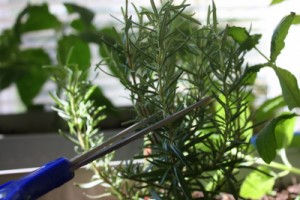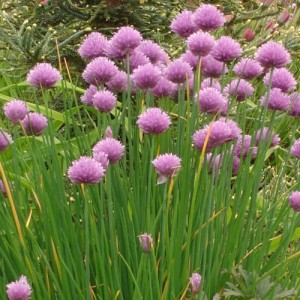Winter is a great time for…
Writing memoirs for no one but yourself.
Turning on family members after being snowed in for two weeks.
Losing nerve endings permanently due to frostbite.

It also can remind you to start some preservation techniques before the whiteout commences. Perhaps one of the easier winter preps for outdoor gardens is in the herb bed.
Before the season of discontent begins, look around at your herb garden. See all that green? Remember all those bland sauces that came to life with the addition of a little thyme or sage? Do you want to preserve those herbs for a bountiful 2012?
Here’s some techniques for saving those outdoor herbs as well as which ones to bring inside and/or start in the windowsill:
1) Preservation
- Be a Mulch Maven–A two to three inch layer of mulch like shredded leaves or wood chips (make sure to add blood meal in the spring if using wood chips to cut down on the carbon) will keep most winter hardy herbs happy through even the most nippy of times. Make sure to mulch after a hard freeze. Mulching before the onset of cold weather will keep the soil warmer and can decrease the herb’s penchant for winter hardiness.
- Fend off Fertilizing–Avoid fertilizing after mid to late August. Any late summer additions that contain nitrogen will initiate new growth that stands a good chance of not maturing before frost hits. The nitrogen signals to the herb to keep growing instead of preparing for winter hardiness.
- Paltry Pruning–Do not do any major pruning in Eastern NC after early August, and no more after early September in Western NC. Serious cuts will not allow the plant to utilize its new growth before the frost hits. Also, avoid heavy pruning (i.e. sage, thyme) in late fall because the plant will not have time to heal before the freeze.

2) Winter Warriors
While there are numerous herbs suited for winter survivial, here are some of the more popular:
- Thyme: Give the herb a good mulch like wood chips for healthy drainage. Since its origin comes from the drier regions of the Mediterranean, try not to over water, since a soggy soil can decrease winter hardiness. Also, provide some kind of wind buffer. Other Mediterranean plants that follow the same guidelines are tarragon, lavender, and oregano (but not Greek oregano).
- Sage: Follow essentially the same requirements as thyme. Try not to overprune. Prune lightly after the first frost to incorporate in teas (good for combating night sweats), incense, and especially any white bean style soups.
- Rosemary…maybe: I cannot wholeheartedly recommend this fussy perennial for withstanding winter (especially a severe one). I have witnessed large bushes that can survive, but I’ve seen many fledglings perish in a Western North Carolina winter. Either bring it in for the winter, or cut it down to several inches high and cover it with soil. Finally, cover it with five inches of mulch. Then, pray.
- –20 Degrees of Seperation: Herbs that can almost be Arctic (thanks to its polar hardiness) include chives, fennel, and mint. A good mulch should be more than enough protection.

3) Get Your Thrill in the Windowsill
Herbs like basil and parsley will perish at even the threat of frost. However, they we will do quite well in a south-facing windowsill. If you want vigorous growth, consider adding several hours of fluorescent lighting like a T5. Instead of bringing tender herbs inside (they can bring unwanted pests onto other houseplants) consider starting some from seed. Some other good herbs for indoors are chives, marjoram, and oregano.

denise says
I am just starting a herb garden. I am going to use containers. I have a baby crib, to have the herbs in. would it be safe to cover with a blanket and then a tarp over the crib from the snow.
ashley says
Hi denise, Cold-hardy herbs such as sage, chives, thyme, will be okay getting some snow on them – but you want to keep the roots protected if growing them in containers. You can do this by mulching the dirt around the bases of the plants and wrapping the pots themselves with a blanket or other cloth. For less hardy herbs, we recommend moving pots inside during winter months. Hope this helps!
wellness says
Great post.